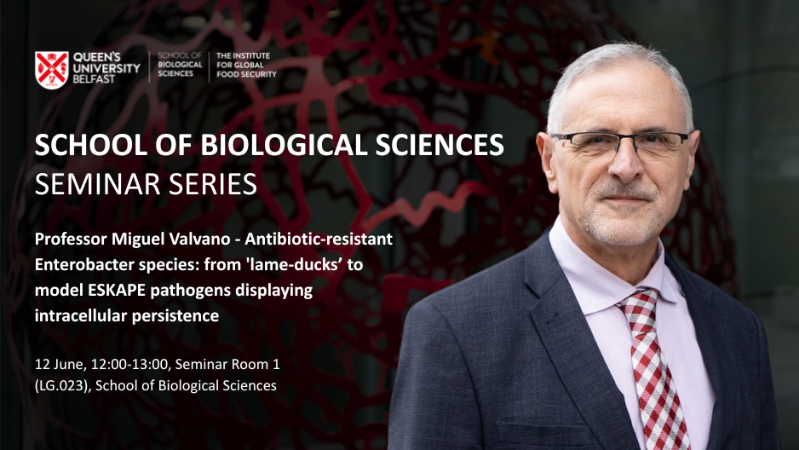We are pleased to welcome Professor Miguel Valvano (WWIEM, Queen's University Belfast) to the School to share his work on Antibiotic-resistant Enterobacter species - from 'lame-ducks’ to model ESKAPE pathogens displaying intracellular persistence.
- Date(s)
- June 12, 2025
- Location
- Seminar Room 1 (LG.023), School of Biological Sciences
- Time
- 12:00 - 13:00
Abstract: Enterobacter species are opportunistic Gram-negative bacteria associated with morbidity and mortality worldwide due to multiple antibiotic resistance that also extends to last-resort antibiotics. Infections by Enterobacter are difficult to treat due to multidrug antibiotic resistance (AMR) including resistance to carbapenems and last-resort antibiotics such as polymyxins; for this reason, Enterobacter species are included in the WHO's high priority list of global threat pathogens for which new antibiotics are urgently needed. Surprisingly, very little is known about the infection biology of Enterobacter spp.
We investigate in my laboratory: (i) the role of the Enterobacter's type 6 secretion system on bacterial competition and niche adaptation; (ii) the development anti-Enterobacter/Klebsiella vaccines to curtail AMR infections; (iii) novel mechanisms of colistin resistance and (iv) the intracellular survival of Enterobacter clinical isolates in primary human macrophages. I will discuss our studies showing that Enterobacter isolates survive but do not replicate in macrophages, residing within a modified late phagolysosome compartment. Survival did not correlate with colistin resistance, lipopolysaccharide modifications, or bacterial pathogenicity in the Galleria mellonella infection model. Remarkably, the intracellular bacteria induce low levels of macrophage cytotoxicity that correlated with absence of cleavage of proinflammatory markers in infected macrophages. Enterobacter spp clinical isolates can persist without replication inside human macrophages with minimal effects on cell viability and inflammation. These observations have implications in the clinical outcome of patients that cannot readily clear Enterobacter infections, which can potentially lead to prolonged intracellular survival and infection relapse.
Learn more about Professor Miguel Valvano's work: click here
- Department
- School of Biological Sciences
- Add to calendar

